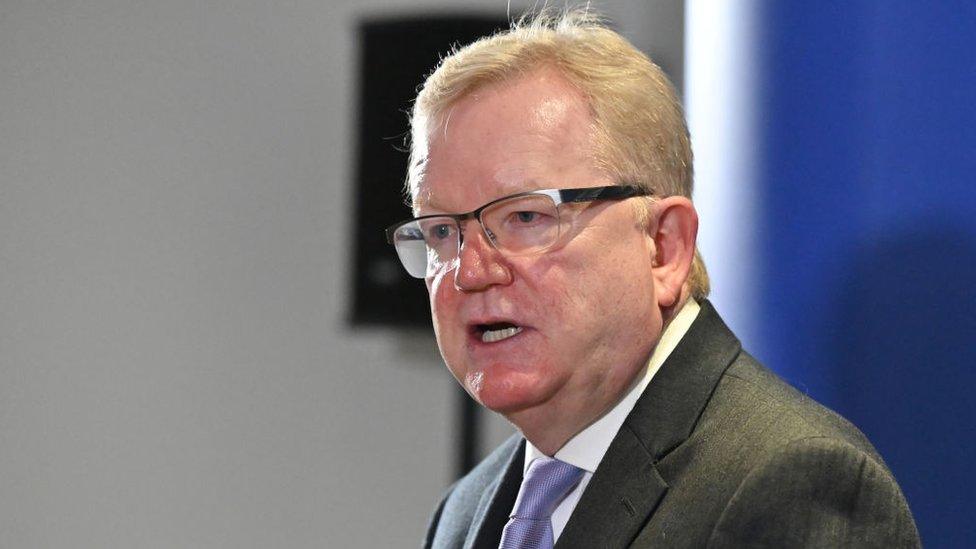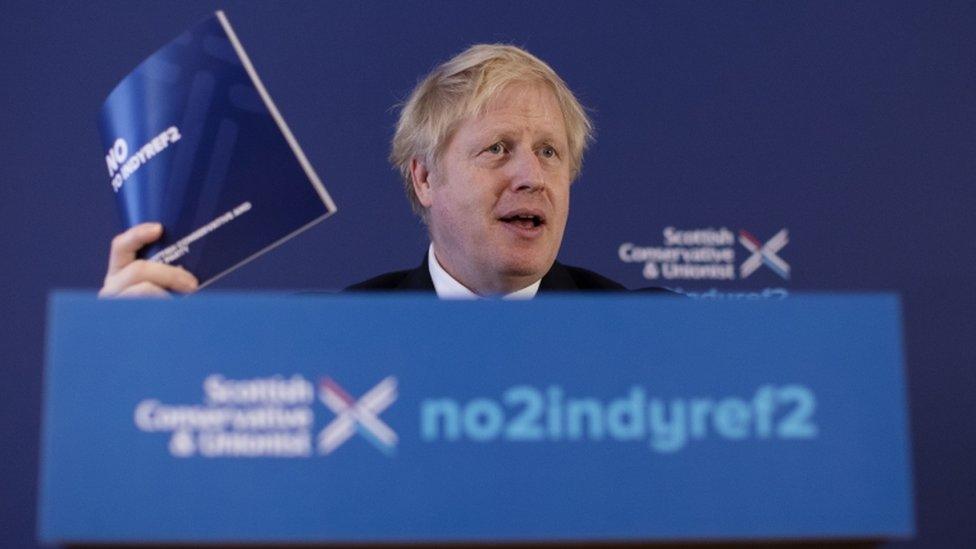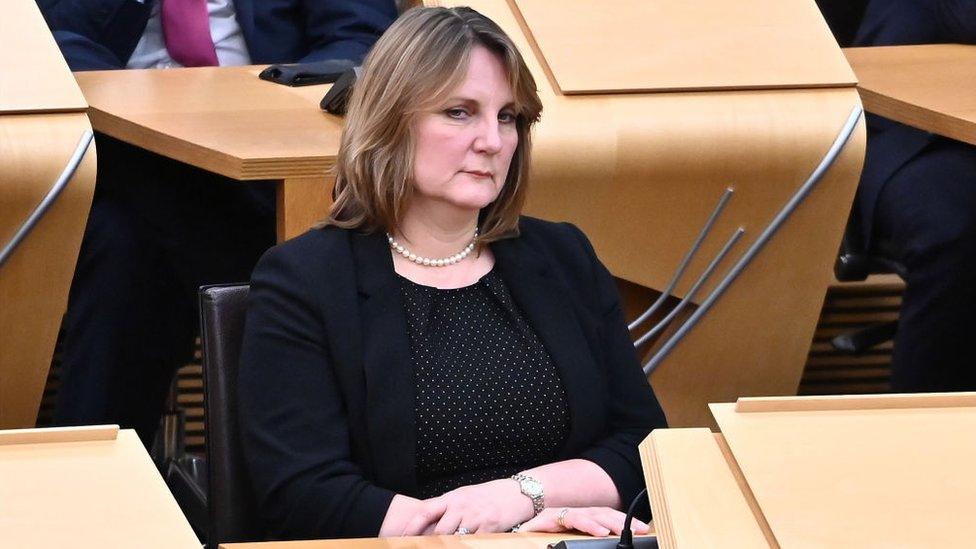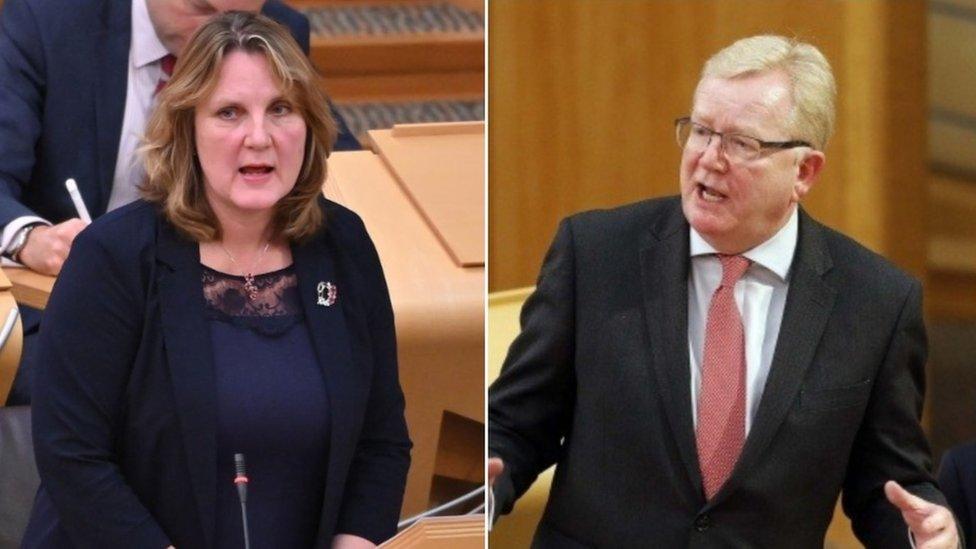Scottish Tory leadership: 'Union Jack Jackson' Carlaw
- Published

Jackson Carlaw has put the union at the "absolute heart" of his leadership campaign
Sagacious folk, my fellow Arabs. (Note: I am using the word "Arabs" here in its post-modern meaning of "fanatical supporters of the mighty Dundee United").
Now, the sagacity of said Arabs has undoubtedly been sharpened by the team's current form. Nothing quite like a fine Shankland hat-trick to boost one's brain-power.
Anyway, this particular fellow Arab was helping me cover the launch of Jackson Carlaw's campaign to win the leadership of the Scottish Tories for real, building upon his present interim status.
Something stirred in my chum's cranium. He inquired: "Do you remember Union Jack Jackson?" Puzzled, I muttered something ineffective about time pressing.
But my fellow Arab persisted. "Union Jack Jackson was a comic book character. In the Hotspur, I think."
A little instant research followed. UJJ did indeed feature in the Hotspur, followed by Warlord and, latterly, Commando. He was a Royal Marine Commando who ended up fighting for the USA. Don't ask, long story.
And the "Union Jack" sobriquet? Apparently, he concealed a miniature Union flag in his palm so that, when he appeared to be saluting the Stars and Stripes, he was actually…..OK, told you it was a long story.
Somehow the tale stuck with me as I watched Team Jackson promote their man. Not sure about Mr Carlaw's credentials as a Marine. But he's decidedly keen on the Union Jack.

He opened by saying he was proud to be standing as "Leader of the Scottish Conservative and Unionist Party". That particular nomenclature formula is guaranteed to win a round of applause from the faithful.
Now, pedants might argue that appending the word "Unionist" to the party title has more to do with the late nineteenth century alliance with the Liberal Unionists who opposed Irish Home Rule.
But politics moves on. While debate continues about Unionism in Northern Ireland, we are largely dealing here with the 1707 connection between Scotland and England.
Mr Carlaw characterised that Union as continuing to deliver for Scotland, as offering a "patriotic alternative" to the "narrow, divisive nationalism of the SNP".
He praised his predecessor, Ruth Davidson, for galvanising "a tired old wreck of a party". Now, the aim was to move beyond being the principal part of opposition.
And to achieve that? Union Jack Jackson glanced at the emblem in his palm - OK, he didn't but bear with me.
The offer "at the absolute heart of everything" was "an unswerving resolve in support of Scotland's place at the heart of the United Kingdom".

Boris Johnson has opposed holding a second independence referendum
In pursuit of that, Mr Carlaw firmly and ineluctably backed the prime minister in his refusal to grant Holyrood the power to hold a further referendum on independence.
As with the PM, he recalled the promise by Nicola Sturgeon and Alex Salmond that the 2014 poll was a "once in a generation" choice.
At which point, we enter the realm of the faintly surreal. What, I asked with my customary cheek, is the definition of a generation? How long? How many years?
Mr Carlaw declined to be specific. He would only say it was longer than the six years which have elapsed since indyref1. A rerun was ruled out, at least, for the duration of the current Westminster Parliament. Which, you will recall, has just been elected.
In an interview outside the launch, I persisted. What if the SNP win the Holyrood elections next year? What if they win outright? What if they win out of the park?
The answer, Mr Carlaw declared, would still be no. They would hold the SNP to that promise of a generation elapsing before the matter might be reconsidered.
Nicola Sturgeon will - and has - a little to say on that subject. More of which another day.
Back to the launch. There was more on display than just Union Jack flag-waving. There was a calculated attempt to position the Scottish party in the centre ground, appealing avowedly to middle Scotland and "blue collar Tories".
For example, his objective on taxation would be to curb the burden upon those earning between £26k and around £45k. He mentioned teachers, nurses and police officers.
That, he said, would take priority over cuts to entice those in the upper earnings brackets. Yes, it was a good idea to attract high earners to Scotland with fiscal incentives - but, for now, middle Scotland took top billing.
A policy declaration which perhaps suggests that persistent SNP jibes about Tory tax cuts for top earners have been effective.
If he wins, there would be a wider review of policy, with nothing sacrosanct. Mr Carlaw was understandably pursued by the wicked media as to which policies he might dump.
Wisely from his perspective, he sidestepped the particulars, preferring instead to focus upon the fundamental tests which would guide decisions.
Why was the policy embraced in the first place? Did it still "encourage success" while securing "fairness and security"?
In all, it was a well-structured launch. Mr Carlaw is firm favourite to win - Michelle Ballantyne will launch next week - but there was minimal sign of complacency.

Michelle Ballantyne is challenging Jackson Carlaw for the Scottish Tory leadership
In practice, of course, this launch was aiming beyond the Tory members who will choose the new leader. It was targeted at the Holyrood elections next year.
Mr Carlaw said his ambition was "to remove Nicola Sturgeon and the SNP from power." So, the wicked media quite reasonably asked, did that mean he would be First Minister? That the Tories would sweep to devolved power?
Enter the surreal, once more. Mr Carlaw came over all coy. He did not, he chuckled, want to sound like Jo Swinson (you'll remember she said she was offering herself to be Lib Dem Prime Minister). He was, however, ready to serve, if given the chance.
There is, of course, more to it than that. Memories persist of the Tories as - what was his phrase - "a tired old wreck of a party."
So the would be Conservative leader treads softly and carefully. No bombast. No over-weening ambition. No boastful declarations.
Rather, the aim is, at least in part, to polarise the electorate - as Ruth Davidson did successfully in the past. To corral all the pro-Union votes into the Conservative pen, sweeping rivals aside.
To do that, it is necessary once more to stress the Tories' staunch and unwavering UK credentials. Union Jack Jackson would wave his palm at that.
- Published6 January 2020

